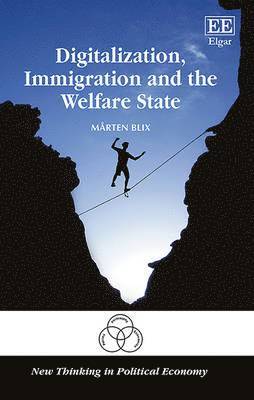
- Format
- Inbunden (Hardback)
- Språk
- Engelska
- Antal sidor
- 200
- Utgivningsdatum
- 2017-01-27
- Förlag
- Edward Elgar Publishing Ltd
- Illustrationer
- illustrations
- Dimensioner
- 240 x 161 x 16 mm
- Vikt
- ISBN
- 9781786432940
- 451 g
Digitalization, Immigration and the Welfare State
- Skickas från oss inom 5-8 vardagar.
- Fri frakt över 249 kr för privatkunder i Sverige.
Passar bra ihop
De som köpt den här boken har ofta också köpt Who's Afraid of Gender? av Judith Butler (inbunden).
Köp båda 2 för 1889 krKundrecensioner
Recensioner i media
'The famous Swedish Model of the welfare state is at a turning point as the pressures of technological change, income inequality and high levels of immigration meet the constraints of the country's inflexible labour and housing markets. Marten Blix argues in this incisive book that with its sound public finances and high levels of trust, Sweden is well placed to respond to the pressures, and he describes a route through these challenges; but it will require some profound institutional changes. The Swedish Model of the future will have to look very different if it is to succeed.' --Diane Coyle, University of Manchester, UK'Using the economic and social laboratory of Sweden, Mrten Blix provides a fascinating window into the future of the welfare state with the threats and opportunities from a massive increase in immigration and rapid digitilisation of the economy. The Swedish Model's core features of collective bargaining, broad unionisation and a strong fiscal base are eroding, increasing inequality and challenging the legitimacy of the political consensus to date. His interesting observations and balanced analysis of the growing importance of platform-based jobs and life-long learning have implications much beyond Sweden.' --Erik Berglf, London School of Economics, UK 'While the treatment of a Citizen's Income is inadequate, this is a most useful book and particularly useful is its focus on Sweden.' --Citizen's Income
Övrig information
Mrten Blix, Research Institute of Industrial Economics, Sweden
Innehållsförteckning
Contents: Preface 1. A Perfect Storm 2. The Welfare State in Transition 3. The Labor Market in Transition 4. Digitalization Changing the Economy and the Labor Market 5. Fiscal Pressures from Digitalization and Immigration 6. Immigration, Inequality and Skills in the Digital Economy 7. Future Challenges for the Welfare State Index
Du kanske gillar
-
Transformed
Marty Cagan
Inbunden


